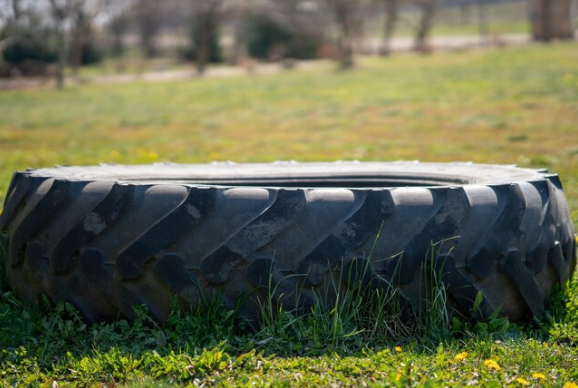Where scrap tires are used in various fields very creatively farmers also open their way to use the scrap tires creatively for their sustainable use. Traditional tire disposal processes like burning or landfilling cause potential environmental risks so using those tires in a different way in the field of agriculture prevents the environment from those risks as well as makes it affordable for the farmers to use these discarded rubber in a unique way and replace the costly objects.
Tire Terraces
Farmers build terraces using used tires as a means of preventing soil erosion and conserving soil. Farmers build barriers to stop soil erosion that comes on by water flow by carefully piling tires along slopes. These tire terraces provide ideal growth conditions for crops by stabilizing the soil and maximizing water retention.
Contour Farming
Farmers that engage in contour farming follow the natural contours of the ground to reduce soil erosion. Used tires make great contour line markers that help farmers shape their fields to fit the topography of the land. By using used tires in their contour farming operations farmers can maximize the amount of fertile land they use while efficiently reducing erosion.
Feed and Water Troughs
Used tires are repurposed as water and feed troughs for animals. Tires can be used as sturdy containers for keeping water and feed when cut in half and attached to the ground, giving animals access to necessary supplies. This creative method gives farmers affordable livestock management alternatives in addition to repurposing used tires.
Structures for Shade and Shelter
Farmers build shade structures and shelters for their cattle by arranging and fixing tires together. By providing cover from bad weather, these tire shelters provide a pleasant and suitable environment for animals to flourish. Additionally, rubber’s insulating qualities help in temperature regulation and guarantee ideal conditions for the well-being of animals.
Pits for Silage
Using wasted tires, farmers build silage pits which are used to store and ferment animal feed. Tires are stacked in a circle and lined with plastic to build robust silage pits that protect grain from contamination and spoiling. This economical way of storing feed extends its shelf life and guarantees that animals will always have access to wholesome feed.
Water Management Systems
An essential component of agricultural irrigation systems is scrap tires. Farmers use scrap tires to build irrigation barriers and channels that focus water flow where it is most needed. By encouraging effective water use and optimizing agricultural yields, these creative irrigation systems help in improving water distribution.
Sustainable Weed Management
Creative farmers use scrap tires as a sustainable weed-control tool. Farmers can reduce the amount of chemical pesticides they use by suppressing weed development between crop rows by placing tires flat on the ground. This environmentally friendly method spares farmers the time and effort that would otherwise be required for hand weeding. It also lessens the impact on the environment.
What is the NYS tire tax on new cars?
When you buy tires, especially in New York state there are some costs associated with it in terms of tax. Among those taxes, the NYS tire tax is one such Collection that frequently raises questions. This tax, which went into effect in New York State on September 12, 2003, applies to all new tires sold for use on automobiles, trucks, trailers, buses, motor homes, and any other type of vehicle that would be eligible for registration under Section 401 of the Vehicle and Traffic Law. Let’s see in more detail about the NYS tax tires.
Also Read: What is the NYS Waste Tire Management
What is the NYS Tire Tax?
The New York State tire tax is a charge applied on the sale of new tires, including ones that were put on when the vehicle was brand-new. This tax will go towards funding a range of environmental programs and projects that support recycling, waste tire management, and environmental conservation throughout the state. Tires that have been recapped or resold (used) are exempt from the charge. It also doesn’t apply to tire purchases made over the phone, online, or through the U.S. Postal Service and delivered to the buyer by a common carrier.
How Much is the NYS Tire Tax?
The tire tax rate in New York is $2.50 per new tire as per the most recent regulations. This implies that an extra $2.50 tax is charged on each new tire that is bought or put on a new car in New York State. It’s crucial to remember that this tax applies to all new tires, including trucks, passenger cars, and specialty tires, regardless of size or kind.
Who is Responsible for Paying the NYS Tire Tax?
Usually, the person who buys the new car or tires is in charge of paying the NYS tire tax. This tax is often included in the total price of the car or tires at the time of sale. However, to be sure that the NYS tire tax is appropriately accounted for and reported, it’s crucial to check your purchase agreement and speak with the dealership. On the other hand, in New York State, tire dealers and retailers have a responsibility to collect the NYS tire tax from customers at the time of sale. They are responsible for regularly sending the tax to the New York State Department of Taxation and Finance after it has been collected. Penalties and fines for non-compliance can result from the failure to collect or remit the New York state tire tax.
Exemptions of NYS Tire Tax
While the NYS tire tax applies to the majority of new tire purchases and installations, certain exemptions include tires for automobiles that, in general, are exempt from registration requirements under the Vehicle and Traffic Law, like:
- Go-carts and electric wheelchairs
- Go-peds, or motorized skateboards and scooters with a handle for a standing rider, are similar to golf carts.
- Minibikes are bicycles with motor assistance that can only be driven on rails or tracks.




